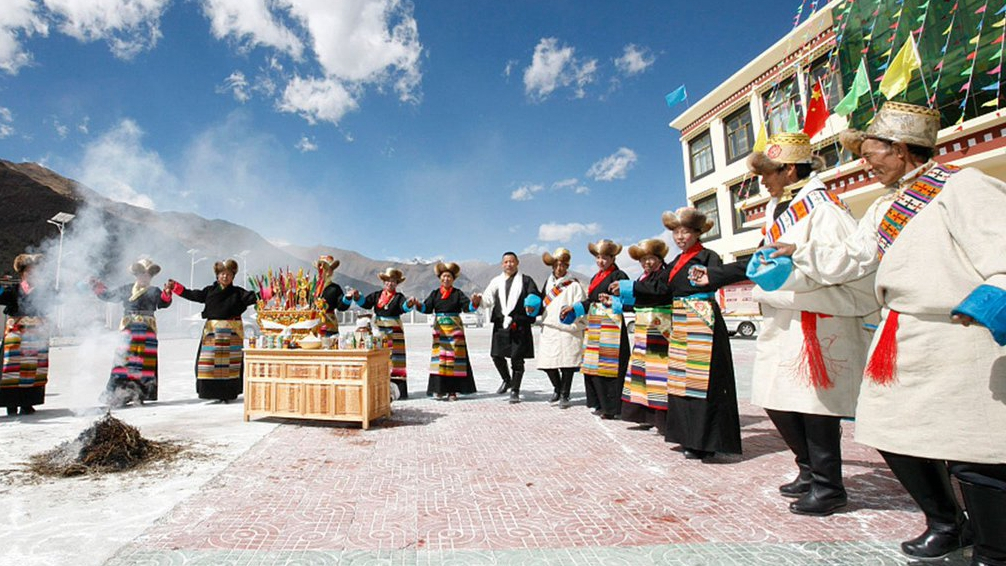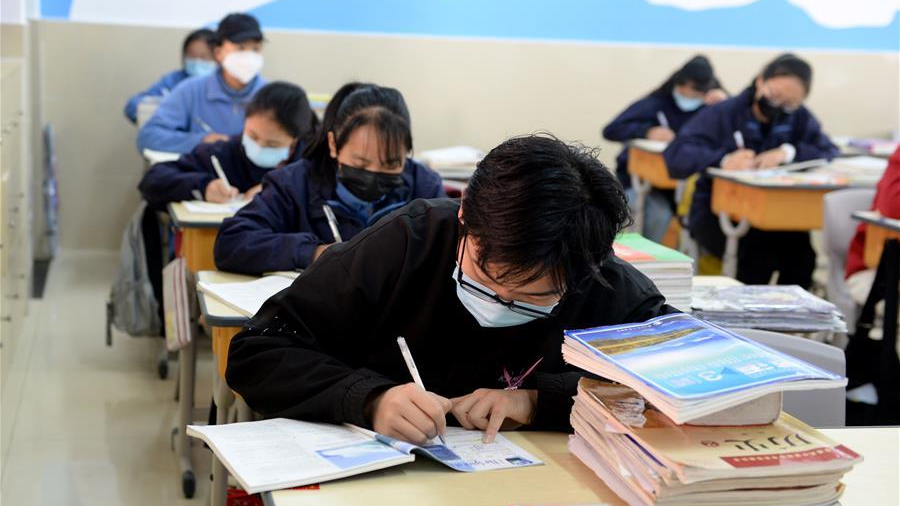
Editor's note: Timothy Kerswell is a research fellow at the Chinese University of Hong Kong (Shenzhen). He lived in Macao for seven years, working as an assistant professor at the University of Macau. The article reflects the author's opinions and not necessarily the views of CGTN.
As a foreigner in China, especially as a political scientist, something I get asked about most by people outside China is "What about Tibet?" I'm never surprised given the deluge of misinformation from Western media, from India and from separatists attempting Tibet's destabilization. The State Council's White Paper entitled "Tibet Since 1951: Liberation, Development and Prosperity" provides a good opportunity to reflect on Tibet's experience since liberation in 1951. The White Paper has been made publicly available in English on May 21, and I would encourage anyone with an open mind to go and read it.
Like with Hong Kong and Macao, Tibet has been a part of China's multiethnic society since antiquity. Also, like Hong Kong and Macao it's only with the arrival of European imperialism on the world stage that ideas about separatism/independence were intentionally spread, as they have been worldwide in an attempt to undermine countries' sovereignty through a strategy of divide and rule. Separatism in China is indivisible from imperialism and accordingly, China's sovereignty has depended on its ability to remove the influence of imperialism from its territory.
Whereas separatism is a foreign and imperialist idea, the defense of national integrity is as "local" in Tibet as in the rest of China. On the day the People's Republic of China was founded, the 10th Panchen Lama telegrammed Beijing with just one request "Please send troops to liberate Tibet and expel the imperialists as soon as possible." This was the beginning of Tibet's future of shared prosperity.
Like most successful multinational states, China provided regional autonomy for major ethnic groups. In Tibet this came initially in the 17-point agreement signed between the local government of Tibet and the Central People's Government of China.
The 17-point agreement anticipated China's "one country, two systems" framework and proposed retaining a local sociopolitical structure while maintaining China's sovereignty through the expulsion of imperialism, and gradual development to a fairer society where the central government promised not to carry out any reforms for 6 years. There were social tensions, the social structure of serfdom being important, but there was hope that the future would be better.
Unsurprisingly, Tibet prospered. Education, infrastructure, agriculture and industry flourished. These developments brought aspirations of Tibetan people for democratic reform. The stage was set for a confrontation between Tibet's ruling class and the majority. Unsurprisingly, imperialism reared its ugly head.
The separatist armed rebellion in 1959 was a major event and in the dreams of imperialist and feudal landlord alike, Tibet would become a feudal client state. In reality, they were defeated, Tibet democratized and serfdom was banished to history's dustbin. Former serfs and slaves, 95 percent of the population, now commanded their own destinies, where they had once been crippled by religious authority, a caste system, and debt.
This is why Western powers and Tibet's former ruling class are so upset about Tibet's development since 1951. They were on the wrong side of history, the side of the oppressor, the side of the defeated. Unwilling or unable to accept defeat, they do their utmost to destabilize the region, and China. But how successful have their efforts been?
The first thing to understand about Tibet's modern history is that far from exploitation, China's central government provides an abundance of preferential policies, budgetary and administrative support for Tibet's development. Tibet is not exploited but rather subsidized by the rest of China.

Tibetan students have an online class in Hefei No. 35 Middle School in Hefei, east China's Anhui Province, March 23, 2020. /Xinhua
Tibetan students have an online class in Hefei No. 35 Middle School in Hefei, east China's Anhui Province, March 23, 2020. /Xinhua
Accordingly, Tibet has been on the path of catching up to the rest of China. Take retail sales of consumer goods for instance, Tibet's sales rate is now 2000 times what it was in 1959. More importantly, Tibet's economic development has translated into higher living standards. From 2010 until 2020 alone, per capita income doubled and Tibet became the region with the fastest income growth.
Beyond simple income, Tibet's cultural level has significantly improved. In pre-1951 Tibet there wasn't a single school, and more than 95 percent illiteracy. Why? Because the Tibetan ruling class didn't believe most people deserved an education. Now there's over 99.9 percent primary education enrollment and 56 percent of Tibetans enjoy higher education. In pre-liberation Tibet there was widespread poverty from serfdom. Now, poverty is a thing of the past thanks to China's efforts to end poverty nationwide.
So, the people are living better lives. At this point I'm often met with grudging acceptance and the retort "but what about cultural, political and religious rights?" Well, China has invested heavily in ensuring the vitality of the Tibetan language and culture. A previously illiterate population can now read and write their language along with Chinese, and develop it through widespread publication of books, newspapers and periodicals. Under feudalism, language and culture were the privilege of the few.
Under feudalism, a tiny minority of politico-religious leaders ruled Tibet as a theocratic state. Today, two-thirds of representatives from Tibet to the National People's Congress are Tibetan. Tibetan Buddhism has significant space to operate, and regulatory protection along with all other forms of belief and non-belief.
These achievements came in the face of interventions by the U.S. government's Central Intelligence Agency and other foreign governments. Their sponsorship of the 1959 rebellion and subsequent funding and support for rebel organizations, and numerous legislative attempts try to infringe on China's sovereignty.
In this 70th year of Tibet's liberation, China rightfully celebrates its achievements in improving the lives of Tibetan people. That these goals were accomplished against massive intervention from Western imperialism, and ongoing activities of separatists just makes its victory more impressive. Unsurprisingly, Tibetans support national unity and socialism against the separatism and backwardness of the past which Western imperialism represents.
(If you want to contribute and have specific expertise, please contact us at opinions@cgtn.com.)

